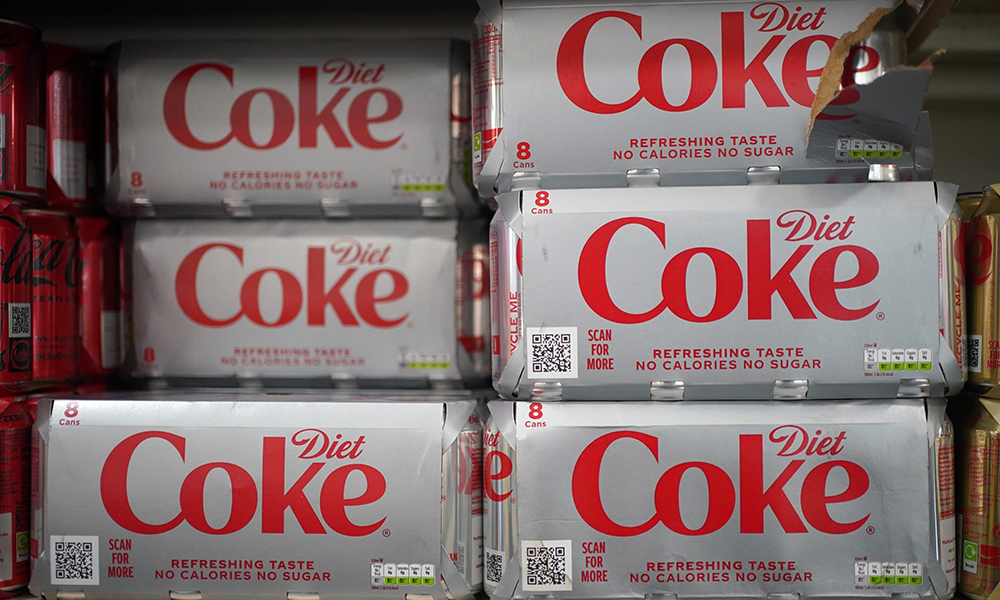
健怡可乐(Diet Coke)的爱好者们迎来了福音,因为世界卫生组织(World Health Organization)发布的第二份报告证实,在这种饮料中发现的一种成分“在实际暴露水平下”是安全的。
今年6月,一份外泄的报告曝光,国际癌症研究机构(International Agency for Research on Cancer)计划将阿斯巴甜列为致癌物质。阿斯巴甜是健怡可乐里常用的人造甜味剂。
但这份评估报告是世界卫生组织的下属部门计划在7月13日发布的两份报告之一。
第二份报告来自由世界卫生组织和联合国粮食及农业组织(UN Food and Agriculture Organization)的专家组成的机构——食品添加剂联合专家委员会(Joint Expert Committee on Food Additives)。这份报告确定了对人体不构成健康风险的阿斯巴甜安全摄入量。
这份报告与第一份报告在同一天发表,其中的结果受到了健康和饮料届利益相关者的欢迎。许多人批评国际癌症研究机构的报告未能提供有关阿斯巴甜安全摄入量的背景信息。
国际癌症研究机构的研究人员包括美国毒理学专家苏珊·埃尔莫尔博士。她解释称:“食品添加剂联合专家委员会是全球食品成分安全性方面的权威机构。与国际癌症研究机构不同,食品添加剂联合专家委员会会考虑其安全性评估的风险和危害,这意味着它的结论针对任何成分对人类健康的实际影响提供了最全面的评估。”
埃尔莫尔说:“由于国际癌症研究机构仅分析了食品成分的潜在危害,但并未评估其风险,因此并不能完整描述一种成分的安全性,例如阿斯巴甜,结果会给社会大众造成不必要的混乱。”
食品添加剂联合专家委员会的研究发现,体重154磅(约69.85千克)的普通人每天摄入超过9罐至14罐无糖饮料,才会出现健康问题。该委员会由来自15个国家的13位委员和13位专家组成。
大量证据
非酒精类饮料行业协会国际饮料协会理事会(International Council of Beverages Associations)对此表示欢迎,认为食品添加剂联合专家委员会所澄清的事实有助于提高消费者的信心。
国际饮料协会理事会的主任凯特·洛特曼对《财富》杂志表示:“世界卫生组织和联合国粮食及农业组织的研究结果经过严格审查后,进一步增强了消费者对阿斯巴甜安全性的信心,在消费者考虑减少糖分和热量摄入时,这份报告将具有重要的指导意义。”
“食品添加剂联合专家委员会认为阿斯巴甜是安全的这一综合结论,是基于四十多年来大量的科学证据,以及90多个国家食品安全部门的积极决定。”
这则消息令饮料厂商长舒一口气,因为此前有类似的研究结果曾经对使用各种食品添加剂的公司造成严重影响。2015年,国际癌症研究机构委员会审查发现,草甘膦“可能致癌”。
2021年,德国制药和农药公司拜耳(Bayer)在对美国法院判决提起的第三次上诉中败诉。该公司被法院判决赔偿客户8,600万美元,因为客户将患癌归咎于使用了拜耳生产的含草甘膦的除草剂。
卡路里控制委员会(Calorie Control Council)的主席罗伯特·兰金称,“显而易见”,食品添加剂联合专家委员会列出的构成危险的阿斯巴甜摄入水平“是不现实的,我们不建议以这种水平摄入阿斯巴甜,而且这也不符合这类成分的预期用途。”卡路里控制委员会是代表低热量和无热量食品饮料行业的国际协会。
兰金告诉《财富》杂志,消费者“强烈渴望”有可靠的信息。他还指出,主张阿斯巴甜不安全“会造成误导,是不准确的,将在全球近5.4亿糖尿病患者和依靠和/或选择含低热量和无热量甜味剂的产品控制体重的数以百万计的消费者当中引起恐慌。”
行业协会美国饮料协会(American Beverage Association)称,无论是美国食品与药品管理局(FDA)还是全球的食品主管部门始终认为阿斯巴甜是安全的,这“让我们对食品安全充满信心”。美国饮料协会的成员包括可口可乐(Coca-Cola)的经销商Abarta和百事可乐公司(Pepsi-Cola)。(财富中文网)
译者:刘进龙
审校:汪皓
健怡可乐(Diet Coke)的爱好者们迎来了福音,因为世界卫生组织(World Health Organization)发布的第二份报告证实,在这种饮料中发现的一种成分“在实际暴露水平下”是安全的。
今年6月,一份外泄的报告曝光,国际癌症研究机构(International Agency for Research on Cancer)计划将阿斯巴甜列为致癌物质。阿斯巴甜是健怡可乐里常用的人造甜味剂。
但这份评估报告是世界卫生组织的下属部门计划在7月13日发布的两份报告之一。
第二份报告来自由世界卫生组织和联合国粮食及农业组织(UN Food and Agriculture Organization)的专家组成的机构——食品添加剂联合专家委员会(Joint Expert Committee on Food Additives)。这份报告确定了对人体不构成健康风险的阿斯巴甜安全摄入量。
这份报告与第一份报告在同一天发表,其中的结果受到了健康和饮料届利益相关者的欢迎。许多人批评国际癌症研究机构的报告未能提供有关阿斯巴甜安全摄入量的背景信息。
国际癌症研究机构的研究人员包括美国毒理学专家苏珊·埃尔莫尔博士。她解释称:“食品添加剂联合专家委员会是全球食品成分安全性方面的权威机构。与国际癌症研究机构不同,食品添加剂联合专家委员会会考虑其安全性评估的风险和危害,这意味着它的结论针对任何成分对人类健康的实际影响提供了最全面的评估。”
埃尔莫尔说:“由于国际癌症研究机构仅分析了食品成分的潜在危害,但并未评估其风险,因此并不能完整描述一种成分的安全性,例如阿斯巴甜,结果会给社会大众造成不必要的混乱。”
食品添加剂联合专家委员会的研究发现,体重154磅(约69.85千克)的普通人每天摄入超过9罐至14罐无糖饮料,才会出现健康问题。该委员会由来自15个国家的13位委员和13位专家组成。
大量证据
非酒精类饮料行业协会国际饮料协会理事会(International Council of Beverages Associations)对此表示欢迎,认为食品添加剂联合专家委员会所澄清的事实有助于提高消费者的信心。
国际饮料协会理事会的主任凯特·洛特曼对《财富》杂志表示:“世界卫生组织和联合国粮食及农业组织的研究结果经过严格审查后,进一步增强了消费者对阿斯巴甜安全性的信心,在消费者考虑减少糖分和热量摄入时,这份报告将具有重要的指导意义。”
“食品添加剂联合专家委员会认为阿斯巴甜是安全的这一综合结论,是基于四十多年来大量的科学证据,以及90多个国家食品安全部门的积极决定。”
这则消息令饮料厂商长舒一口气,因为此前有类似的研究结果曾经对使用各种食品添加剂的公司造成严重影响。2015年,国际癌症研究机构委员会审查发现,草甘膦“可能致癌”。
2021年,德国制药和农药公司拜耳(Bayer)在对美国法院判决提起的第三次上诉中败诉。该公司被法院判决赔偿客户8,600万美元,因为客户将患癌归咎于使用了拜耳生产的含草甘膦的除草剂。
卡路里控制委员会(Calorie Control Council)的主席罗伯特·兰金称,“显而易见”,食品添加剂联合专家委员会列出的构成危险的阿斯巴甜摄入水平“是不现实的,我们不建议以这种水平摄入阿斯巴甜,而且这也不符合这类成分的预期用途。”卡路里控制委员会是代表低热量和无热量食品饮料行业的国际协会。
兰金告诉《财富》杂志,消费者“强烈渴望”有可靠的信息。他还指出,主张阿斯巴甜不安全“会造成误导,是不准确的,将在全球近5.4亿糖尿病患者和依靠和/或选择含低热量和无热量甜味剂的产品控制体重的数以百万计的消费者当中引起恐慌。”
行业协会美国饮料协会(American Beverage Association)称,无论是美国食品与药品管理局(FDA)还是全球的食品主管部门始终认为阿斯巴甜是安全的,这“让我们对食品安全充满信心”。美国饮料协会的成员包括可口可乐(Coca-Cola)的经销商Abarta和百事可乐公司(Pepsi-Cola)。(财富中文网)
译者:刘进龙
审校:汪皓
Diet Coke addicts rejoice—a second report from the World Health Organization has confirmed that an ingredient found in the drink is safe at “real-world exposure levels.”
Last month it was revealed in a leaked report the International Agency for Research on Cancer (IARC) was set to label aspartame, a popular artificial sweetener used in Diet Coke, as a carcinogen.
However, this assessment was the first of two from branches of the WHO due to be released on July 13.
A second report from a body made up of WHO and UN Food and Agriculture Organization (FAO) experts—named the Joint Expert Committee on Food Additives’ (JECFA)—sought to identify how much aspartame humans can safely consume before it becomes a health risk.
The results—published on the same day as the first report—have been applauded by stakeholders in the health and beverage community, many of which had criticized the IARC report for not providing context around how much aspartame can be safely consumed.
Among the observers of the IARC report was Dr Susan Elmore, a U.S.-based toxicology expert, who explained: “JECFA is the world’s leading authority on food ingredient safety and, unlike IARC, takes into account both risk and hazard when it conducts its safety review, meaning its conclusions provide the most comprehensive assessment of any actual impact on human health.
“Since IARC only looks at the hazard potential and not risk, it does not paint a full picture of the safety of an ingredient, like aspartame, and as a result can cause unnecessary public confusion,” Elmore added.
According to JECFA’s findings—which were conducted by 13 members and 13 experts from 15 countries—the average 154lb person would need to consume more than nine to 14 cans of diet beverages every day over the course of their life to raise safety concerns.
“Overwhelming body of evidence”
The International Council of Beverages Associations—a trade organization for the nonalcoholic beverage industry—welcomed the clarification for the confidence it gives to consumers.
Kate Loatman, the director of the body, told Fortune: “After rigorous review, this landmark WHO and FAO finding further strengthens confidence in the safety of aspartame will play a vital role in informing consumers as they consider all options to reduce sugar and calories in their diets.
“JECFA’s comprehensive conclusion that aspartame is safe builds on the overwhelming weight of scientific evidence for more than four decades, as well as positive determinations by food safety authorities in more than 90 countries.”
The news will come as a relief to beverage producers as similar rulings in the past have resulted in a massive impact on businesses that use the ingredients. In 2015, the IARC committee conducted a review that found glyphosate is “probably carcinogenic.”
By 2021 German drug and pesticide business Bayer had lost its third appeal against U.S. court verdicts that awarded damages of $86 million to customers blaming their cancer on use of its glyphosate-based weed killers.
Robert Rankin, President of the Calorie Control Council—an international association representing the low- and reduced-calorie food and beverage industry—said that “obviously” the level of consumption outlined by JEFCA that would cause aspartame to be dangerous is “not realistic, recommended, nor is it aligned with the intended use of these ingredients.”
He told Fortune consumers have a “strong desire” for reliable information, adding that to assert that aspartame is anything other than safe would be “misleading, inaccurate, and fear-mongering to the nearly 540 million people globally living with diabetes and millions of others managing their body weight who rely on and/or chose products that contain low- and no-calorie sweeteners.”
Trade association American Beverage—which counts Coca-Cola distributor Abarta and Pepsi-Cola among their members—said the fact that not only the FDA, but food agencies worldwide, have continually found aspartame safe “makes us confident in the safety of our products.”






